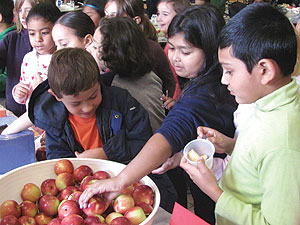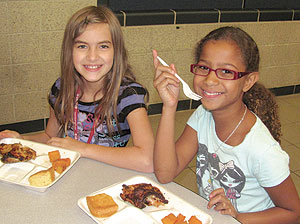
Second graders (left to right) John Rotundo, Syeda Kawsar and Hardik Pokhrel participated in apple tasting during Food Day activities at the Argenziano School. - Photo by Elizabeth Sheeran
Somerville schools celebrate first annual
Food Day
By Elizabeth Sheeran
This was not their parents’ school lunch.
Somerville public elementary school kids dined Monday on roasted herb chicken – real chicken, not the nugget kind – accompanied by locally grown butternut squash, cornbread freshly made at a local bakery, and apples straight from the orchard near Lunenburg.
“It’s really good. It’s different from what we usually have, like chicken nuggets, mozzarella sticks or pizza,” said Glenda Pereira, a fourth grader at the Argenziano School.
“I hope we have it a lot more often,” said her classmate Jillian Gomes. “I think it’s healthier because I think chicken nuggets have a lot of grease and stuff like that.”
The occasion was the first annual Food Day, a nationwide event launched to promote healthy, affordable, sustainable food in the American diet. In Somerville schools, it was a day to celebrate food that comes fresh from the source, without a whole lot of processing along the way.
“It’s helping these kids learn what real food is, rather than the fast food world they’ve been living in,” said Charlotte Stephenson, the nutrition outreach coordinator for Somerville Public Schools.
Children’s Hospital Boston lists junk food as one of the culprits contributing to a rising tide of childhood obesity nationwide. One in three American children is overweight or obese, according to the Centers for Disease Prevention, and childhood obesity has nearly tripled in the past 30 years. The trend is linked to a whole host of diet-related health issues in both kids and adults, including diabetes and heart disease.

Argenziano School fourth graders Jillian Gomes and Glenda Pereira enjoyed a special Food Day lunch, including roast chicken, butternut squash and cornbread.
“Most kids – like most adults – are not eating enough fresh fruits and vegetables and whole grain foods,” said Jeff Cronin of the Center for Science in the Public Interest, the independent, non-profit organization behind Food Day. “We thought it would be a good idea to have a nationwide day, like Earth Day, to celebrate and learn about the foods that should be at the center of our diet.”
Cronin said the day, to be celebrated each year on October 24, will also bring together efforts to make food more affordable and sustainable, by supporting local farms and advocating for safe, humane food production. Food Day organizers have an ambitious goal: “Nothing short of changing the American diet.”
Stephenson, the school nutritionist, said Food Day was a great opportunity to highlight all the things Somerville is already doing to get kids to make better food choices. The city is already a few steps ahead of new state and federal school food guidelines that will take effect in the next few years. The deep fryers and soda machines are long gone from Somerville school lunchrooms, fresh fruits and vegetables are always on offer, each elementary school has its own garden on site, and food is from local sources wherever possible.
Jeanne Irwin, Somerville schools’ food services director, said the schools spend $100,000 annually on produce, and up to 40 percent of that is from local farmers. Baked goods come from a bakery in Somerville and all milk is bought locally. Buying locally supports local businesses, saves money over the long term, and is better for the environment because food isn’t being trucked across the country.
But nutritionists like Stephenson also say it goes a long way toward getting kids to eat better. “If the food is fresher, the nutrients are going to be preserved better. If it’s fresh, it’s going to taste better and the kids are going to like it better and be more likely to go home to their families and say they want to have it again. When it comes down to it with kids, it’s all about taste,” said Stephenson.
Tracie Gillespie, a nutritionist who teaches about good eating habits in Somerville schools, said most kids will try healthy food if they’re given the chance. “When it’s offered to them, they love it,” she said, referring to the veggie and dairy snacks her team brings into local classes. “They’re not asking, ‘why can’t we have candy bars or chips?’ When we walk out of a classroom our bags are empty.”
A mother of two Somerville public school students herself, Gillespie said the city is already a leader when it comes to promoting healthier fare at school. But there’s still a lot to be done. School lunch menus are still limited by budget constraints, and schools can only do so much when kids aren’t the ones buying the groceries at home. “I hope they’re making those choices at home. You just don’t know,” said Gillespie.
Gillespie is hopeful that Food Day will eventually change attitudes about food for both parents and kids, the way Earth Day has changed how most of us think about the environment. But she thinks it could take a generation or more before we see real changes in the American diet.
“We didn’t just get fat overnight,” said Gillespie. “It took us over 20 years to see ourselves in this condition. It’s going to take at least that long to get ourselves out of it.”
Today’s kids may not realize that it’s going to be up to them to try to solve the obesity epidemic some day. But they are already learning to appreciate fresh, local food.
Food Day activities at the Argenziano School included a chance to sample two different varieties of freshly picked local apples. Second grader John Rotundo, who voted for the McIntosh, said he could tell the apples were fresh from the farm. “It tasted kind of like the ones I get when I go apple picking,” he said.


















Reader Comments